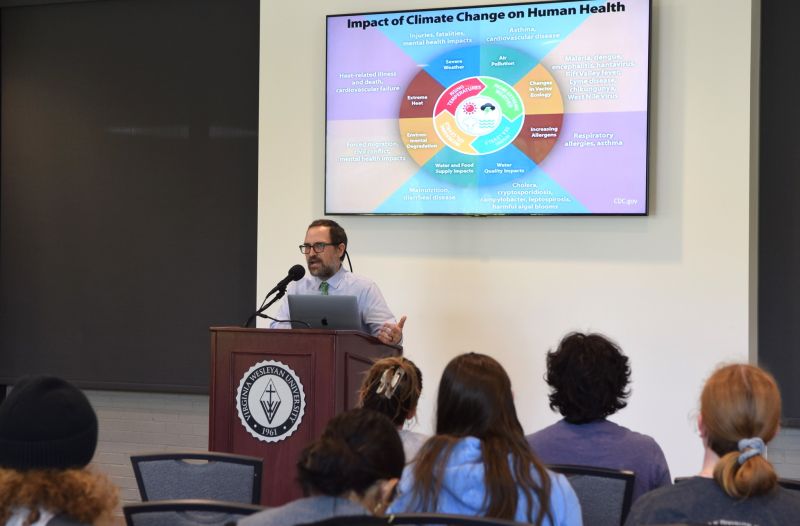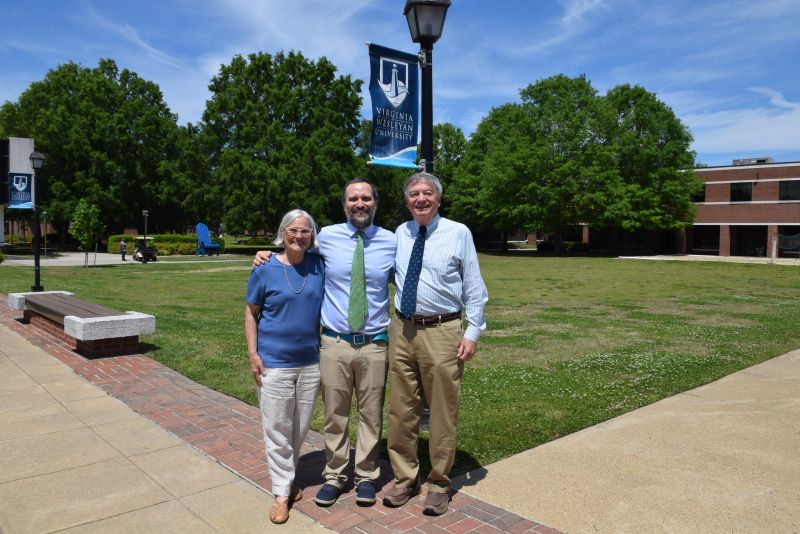Climate and Crisis: Preparing Physicians for a Changing Planet
NYC emergency medicine physician issues urgent call to action
University News | April 24, 2025
View Photo Gallery Watch Full Presentation
For the most part, Dr. Aaron Hultgren has seen it all. As an emergency room physician at Bellevue Hospital in New York City, he regularly treats the kinds of trauma expected in a bustling urban center with the world’s largest police force. But increasingly, the cases that trouble him most are not from violence between people—but from the violence inflicted on the planet. 
Speaking at an event hosted today by Virginia Wesleyan’s Robert Nusbaum Center, Department of Earth and Environmental Sciences, Marlins Go Green, and the Thirst student organization, Dr. Hultgren outlined the growing health impacts of climate change—trends that he says are impossible to ignore.
“‘Once-in-a-lifetime’ events are happening every year,” he warned, citing the increasing frequency and intensity of hurricanes, floods, and extreme temperatures. These shifts, he says, are driving a cascade of public health crises: disease-carrying pests in new regions, disrupted food systems, and rising deaths from heatstroke, respiratory and heart illnesses, and diseases like West Nile and Malaria, carried by mosquitoes and ticks.
He referenced a sobering statistic—8.1 million people died from pollution-related causes last year alone. And in just one county, Maricopa County, Arizona, 645 people lost their lives in 2023 due to heat-related illnesses.
“Can we be healthy if we don’t have a healthy planet?” Dr. Hultgren asked—echoing a question often posed by his father, Dr. Larry Hultgren, who recently retired after 55 years of teaching philosophy at Virginia Wesleyan. The answer, he implied, is becoming increasingly clear. 
Populations most at risk include infants, the elderly, people experiencing homelessness, outdoor workers and athletes, pregnant women, those with pre-existing medical conditions, emergency responders, and low-income communities.
“I wish people could stand in my shoes and see what I see,” Dr. Hultgren said. “We need more climate-informed physicians—not just to treat patients effectively, but to speak out for systemic change.
In addition to his medical degree, Dr. Hultgren earned a Master of Public Health from Columbia University’s Mailman School of Public Health and serves as an assistant professor at the NYU Grossman School of Medicine. He is a core faculty member in the NYUGSOM/Bellevue emergency medicine residency program, where he leads the Climate Medicine and Global Health Scholarly Academy. He is also a Fellow in the Academy of Wilderness Medicine and recently completed a Diploma in Climate Medicine through the University of Colorado School of Medicine.
Now, Dr. Hultgren is expanding his impact by staging Climate Medicine Bootcamps and incorporating climate-related health training into the education of his medical students and residents. With the effects of climate change worsening each year, he says the global community needs to change the mindset of the next generation of physicians—equipping them not only to respond to the crisis, but to lead in shaping a healthier, more resilient future.

